Iranian Regime Continues Arresting Activists, Issuing Heavy Sentences
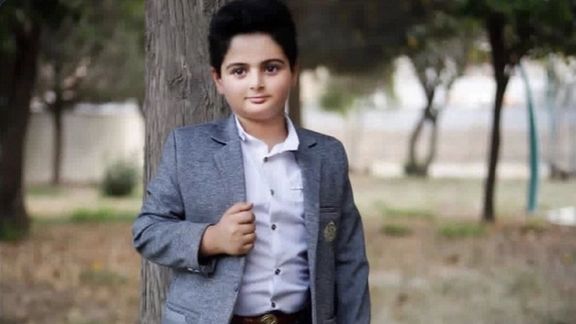
In the fifth month of protests against Iran’s clerical rulers, the Islamic Republic continues to arrest activists and journalists and issues heavy sentences for detainees.

In the fifth month of protests against Iran’s clerical rulers, the Islamic Republic continues to arrest activists and journalists and issues heavy sentences for detainees.
In the most recent case, Kian Pirfalak's mother has been banned from her job at a school. The ten-year-old Kian Pirfalak was shot dead by plainclothesmen in Izeh in the southwestern province of Khuzestan on November 16.
According to the Coordinating Council of Iranian Teachers' Trade Association the ministry of education summoned Zeinab Mollaie-Rad, on Saturday telling her that "until further notice, she must not go to school."
Meanwhile, brother of Ahmad Raisi, the former employee of a university in the western city of Hamedan reported that his brother is locked in solitary confinement and has been on a hunger strike for the past 10 days.
Reports also say prisoners are still being tortured in custody. Activists say Mazaher Heydari, a detainee belonging to the Gonabadi Dervish religious sect, was transferred from Chabahar Prison in the south to Shahrekord in the west last week for more interrogation. Heydari, had previously informed about his torture and forced confessions.
The judiciary further continues to issue heavy sentences for detainees. Reyhaneh Taravati, a photographer and civil activist, was sentenced to six years in prison on a charge of "holding gatherings and propaganda against the regime", which will be enforceable for 5 years if confirmed in the appeals court.
Melika Heshemi, the reporter of Shahr news agency, who had gone to Evin prison, has been arrested too.
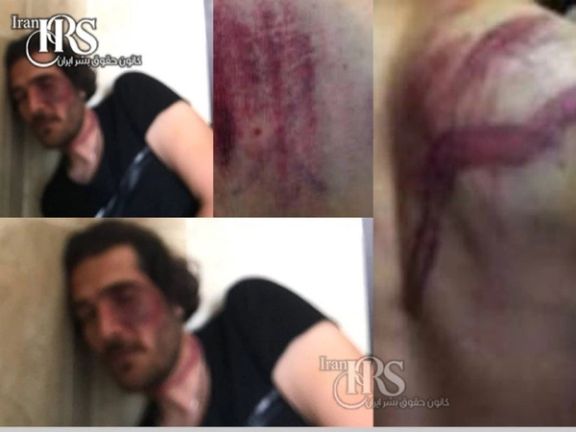
Reports by Iranian human rights activists indicate that a detained protester in Shahr-e Rey south of Tehran has gone into coma due to severe torture.
Activists say Hassan Firouzi fell into coma on Friday because of torture, bleeding and lack of access to treatment.
The-34-year-old man was brutally tortured after being arrested during recent protests, according to human rights organizations, and a revolutionary court sentenced him to death.
Iran Human Rights Monitor, a non-political France-based organization that reveals human rights violations in Iran, announced January 16 that Hassan Firouzi had said his "only wish" was to see his daughter before execution.
The report says Hasan Firouzi suffered severe bleeding after torture and beatings by interrogators with a chair, and while he lost his left kidney, no treatment was provided to him.
Meanwhile, the lawyer of one of the detained protestors in Khorramabad in Western Iran said his client fell into coma due to an infection from injuries he sustained during the arrest.
"My client, Mohammad Ekhtiarian, one of the detainees in recent protests, is in a coma due to the infection of the wounds caused during the arrest," he wrote on his Instagram page.
According to Iran's Prisons Atlas, Mohammad Ekhtiarian is a bodybuilder and during the nationwide protests following the death of Mahsa Amini in police custody, he was wounded in the leg after being shot by the security forces and then arrested.
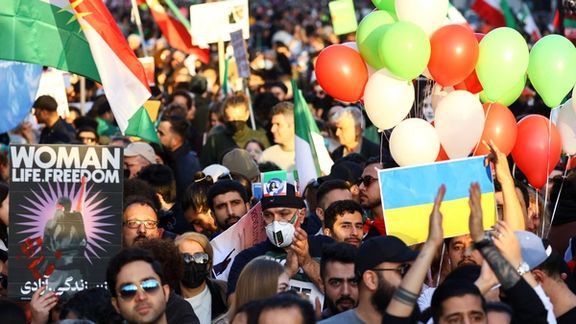
A prominent commentator says the Iranian uprising is a fire under the ashes that can flare up any moment for any reason and create even a more massive movement.
In an interview with reformist daily Etemad, centrist academic Sadegh Zibakalam also warned the government about its annoying treatment of women and young Iranians. It would be wrong to go back to repressive policies the government followed prior to the death in custody of Mahsa Amini, which led to the country's biggest uprising since mid-September.
Zibakalam added that some Iranian officials deny the crisis in Iran and believe that protests were created by foreigners, but it is over now. However, he warned that the reasons for the uprising are still there, and future protests could be even more widespread.
The outspoken pundit said if there is no change in Iran and the government continues its repressive policies, there are reasons to be worried about the future of the regime. The people's demand for regime change is an outcome of disillusionment and despair and lack of hope in reforms, he argued.
After four months of unrest, protesters are more determined that the clerical regime should go and a secular, democratic political system must replace it.
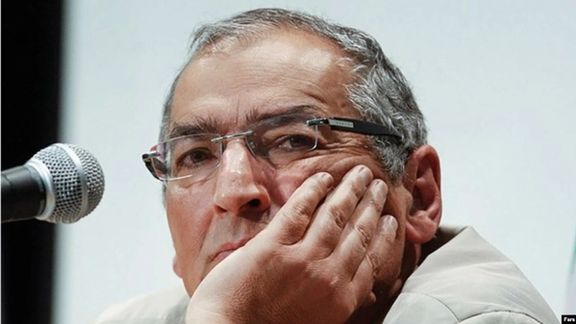
Zibakalam said that university students were the driving force behind the protests. It looks like there is a slowdown in protests only because the universities are currently closed for exams and because because of enormous government pressure. But this does not mean the protests have receded.
The academic said that during the past 43 years, the student Basij was created to stop Iran's student movement, but not only the Basij has not been successful, the student movement has gained more power and momentum year after year.
Criticizing the consolidation of conservative's control over Iran in the 2021 presidential election by barring others from running, Zibakalam said you cannot control 80 million Iranians by one or two million radical revolutionaries.
Meanwhile, reformist lawmaker Massoud Pezeshkian criticized his colleagues at the Iranian Parliament (Majles) for chanting slogans such as death to this or that country instead of trying to correct the state of affairs in Iran. "We need to tolerate others and work and collaborate with the world," he said adding that "we need to create solidarity inside Iran."
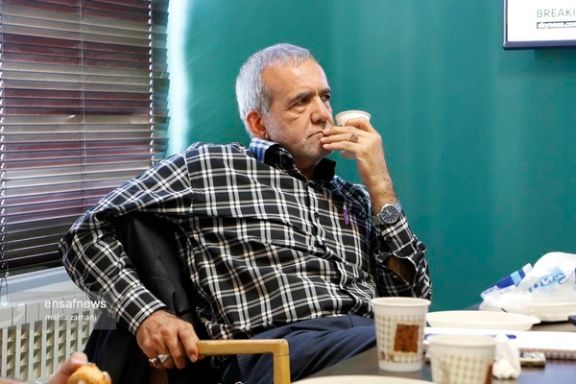
"When you say death to this or that country, they will also say death to you," Pezeshkian quipped.
Referring to some officials' radical threats against other nations during the past week, the lawmaker from Tabriz, criticized the government for doing away with experts in the government and giving big jobs to incapable people with no experience or knowledge. The failure of government policies is the outcome of our choice of managers and officials, he said.
Pezeshkian then asked whether the government can replace some officials and appoint new ones. "This cannot be done. This government is basically incapable of solving the country's current problems," he said.
Levelling similar accusations against the government, conservative politician Hedayatollah Khademi told Nameh News that President Ebrahim Raisi needs to replace some of his ministers in order to save himself. "There is no reason for him to continue working with these inefficient individuals who are the subject of many jokes among citizens. All cabinet members must be changed," he said, adding that "Iran is the only country in the world whose foreign minister and nuclear negotiators cannot speak English."
Khademi also criticized the parliament for failing to supervise the government's performance. He charged that most lawmakers are currently working on their re-election or if they have no hope, they are appeasing the government to make sure that they will get a job after they finish their term in the parliament.

Iranian protesters held a rally outside the Imam Ali Mosque north of Stockholm, demanding the closure of the center, calling it "Islamic Republic's espionage nest."
The protesters paid homage to the victims killed by the Islamic Republic, lighting candles, and placing flowers next to their photos.
About two million of Sweden's population is made up of immigrants with different religions, and the government provides financial assistance to their religious centers, including the Imam Ali Mosque in Stockholm, affiliated to the Islamic Republic.
However, Iranians living in Sweden, human rights and political activists believe Imam Ali Mosque is not a place of worship, but a "nest of espionage for the Islamic Republic".
In the past year, Swedish media published numerous reports about Imam Ali and other mosques, including in Malmö, saying that temporary marriages are practiced in these mosques, calling it "legal prostitution".
Some Swedish parliamentarians have also called for the closure of such places because, according to them, these mosques, specifically the Imam Ali Mosque, receive funding from non-democratic governments such as the Islamic Republic of Iran.
In the past weeks, Iranians also gathered in front of the Islamic Center in Frankfurt and Hamburg, calling them dens of Islamic Republic espionage and demanding their closure.
In the meantime, Iranians living in Melbourne, Sydney, Adelaide, Brisbane, Hamburg, Cologne, Berlin, Copenhagen, Auckland, etc., held gatherings on Saturday to express support for the Iranian people's uprising against the Islamic Republic.
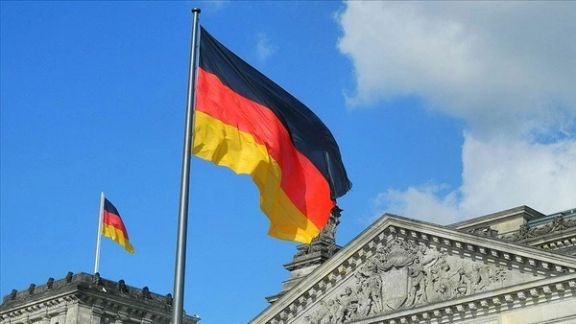
German foreign ministry says the authorities of the Islamic Republic have denied the arrest of a German citizen in Iran reported earlier this week.
In response to Iran International, the German foreign ministry denied the arrest of one of its nationals in Iran, saying “the issue was raised in Iranian media, but after consultations with Iranian authorities, we realized this is not true.”
This ministry had earlier issued a statement following a report by Jam-e Jam daily announcing that the German embassy in Tehran is working hard to make this issue clear.
Jam-e Jam daily, which is owned by Iran's state broadcaster, reported Tuesday that a German national was arrested while taking photos of Omidiyeh oil facilities in the southern Khuzestan province.
A number of European citizens are imprisoned in Iran, but only the names of some of them have been published.
Irish-French prisoner Bernard Phelan is another foreigner arrested on October 3 during anti-regime protests that have swept the country following the death of Mahsa Amini in police custody on September 16.
He has been on hunger strike since the beginning of the New Year, but on Friday he accepted to eat upon the request of his family.
However, Phelan warned if there is no improvement in his situation, he will go on hunger strike again.
Earlier in the month, the Islamic Republic’s judiciary sentenced Olivier Vandecasteele, who was detained in 2022, to 40 years in prison and 74 lashes for alleged “spying and cooperation with the United States, money laundering and currency smuggling $500,000 out of Iran.”
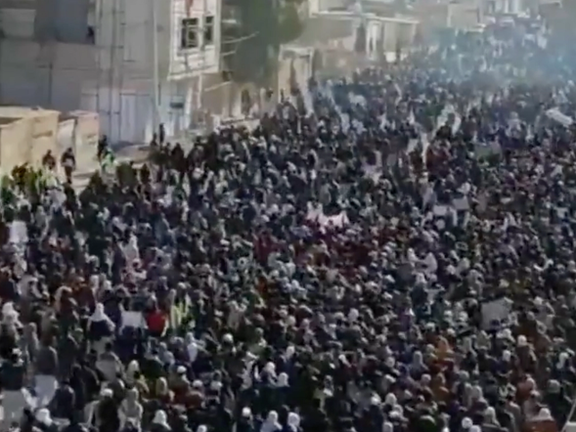
Following a large protest rally in Iran’s southeastern city Zahedan on Friday, security and intelligence agents launched a new wave of arrests aimed at young people.
Thousands of Baluch citizens took to the streets in Zahedan Friday for the 16th consecutive week and chanted “Down with the Dictator” and “Khamenei is a murderer; his rule is illegitimate”.
The Sunni Baluch population have held protests in Zahedan every Friday after prayers since September 30 when government forces cracked down on demonstrators, killing more than 80 people.
Reports say a new round of detaining Baluch teenagers and youths is underway since Friday, and according to Hal Vash website, which monitors events in Sistan-Baluchestan province and those affecting Iran's Sunni minority, police forces arrested several young Baluch men in different neighborhoods of the city.
While Iran’s Judiciary claimed earlier this week that thousands of protesters have been freed, it arrests more people, and those released face legal charges that can send them back to prison.
"The families of the detained citizens have held gatherings in front of the police station demanding the release of their children," added Hal Vash.
Based on the report, security forces have arrested several Afghan and Uzbek nationals living in Zahedan, threatening residents not to do business with these Sunni people.
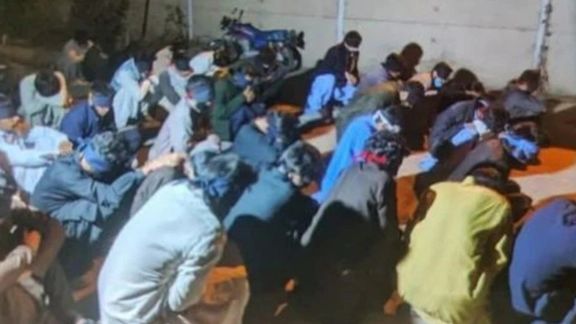
On the other hand, regime forces and plainclothes agents arrested Baluch people who did not have identity documents or were not carrying it.
The pressure on Baluch citizens has began since Wednesday with setting up checkpoints at several roads leading to Zahedan.
Mowlavi Abdolhamid, the outspoken Sunni leader of Zahedan delivered yet another fiery sermon Friday protesting the doubling of checkpoints. “Seven stop and search checkpoints have turned into fifteen,” he said.
Abdolhamid has become an effective critic of the Islamic Republic since September, speaking freely even against Supreme Leader Ali Khamenei. Although the regime could arrest him anytime, that would lead to further trouble with Sunnis, and especially the Baluch population who regard them as a community leader and an advocate of their grievances.
The new measures included at least fifteen concrete block stop and search checkpoints on roads leading to Zahedan to control the flow of cars into the city, with security forces demanding identification and often questioning passengers. Internet connection has also been heavily restricted in the province since protests began four months ago.
“A government that does not listen to the voice of the people does not deserve to rule,” said Mowlavi Abdolhamid in his Friday sermon in Zahedan, capital of the restive Sistan-Baluchestan Province.
In recent weeks, the Islamic Republic has threatened and arrested dozens of citizens in Sistan and Baluchestan and beefed-up security in Zahedan with the aim of ending the routine protests on Fridays.
The detainees were mostly teenagers and young people, and according to Baluch activists, many of them are under pressure to "give forced confessions".
Since the beginning of protests in Zahedan and other cities of the province, many citizens have been detained with the fate of many remaining unknown.
According to Hal Vash, the regime has sent private messages to Mowlavi Abdolhamid through influential tribal figures, threatening to arrest him and destroy Makki Mosque in which he delivers sermons.
The increase of threats, along with mass arrest of Baluch youths, has raised concerns about the possibility of another brutal attack by the regime on Zahedan protesters.